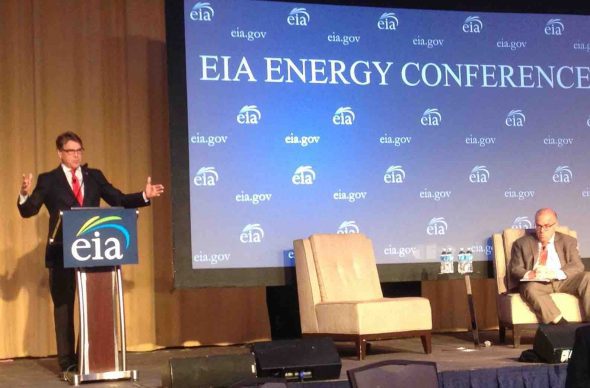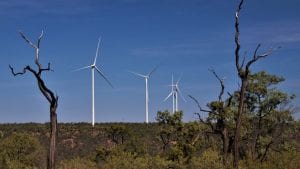According to Energy Secretary Rick Perry, the Obama administration demonstrated a hostility to coal and a preference for renewable energy that is threatening the reliability of the U.S. power grid — although Perry’s concerns were immediately undercut by one of the nation’s top grid regulators.

Perry, speaking at the U.S. Energy Information Administration’s annual energy conference in Washington, D.C., said that under his leadership the Department of Energy will do what it can to ensure baseload generating capacity, such as coal and nuclear power, “is not tossed aside in the name of some political favorite.”
To that end, “I’ve asked the staff of the Department of Energy to undertake a critical review of regulatory burdens placed by the previous administration on baseload generators,” Perry said.
“Baseload power is critical to a well-functioning grid. … But over the last several years, grid experts have expressed concern about the erosion of critical baseload resources.”
Colette Honorable, a commissioner at the Federal Energy Regulatory Commission (FERC), said in a presentation immediately after Perry’s that the introduction of greater amounts of renewable energy has “absolutely not” harmed grid reliability.
Recent history shows that large amounts of renewables have been successfully integrated into regional grids across the nation, Honorable said. “I have seen no problems with reliability,” she said. “Bring on more renewables.” FERC regulates the interstate transmission of natural gas, oil, and electricity and oversees the operation of almost all of the nation’s regional power grids.
For his grid study, Perry requested DOE investigate how federal subsidies boost one form of energy at the expense of baseload generation. He specifically directed the agency to look at the extent to which “continued regulatory burdens, as well as mandates and tax and subsidy policies, are responsible for forcing the premature retirement of baseload power plants.”
Several Democratic senators called the request for the grid reliability study “a thinly disguised attempt to promote less economic electric generation technologies, such as coal and nuclear, at the expense of cost-competitive wind and solar power.”
A draft of the study, originally slated for completion this week, is scheduled to be submitted to Perry in early July, Axios reported last week.
Honorable, who tweeted on Monday that this is her last week as a FERC commissioner, told reporters after her presentation that her agency has been in touch with the DOE staff who are working on the grid reliability study.
“We have offered to be supportive of them. And we’ve provided them with publications and other information,” she said. “We carry out this work every day. And we look forward to helping the new administration at DOE understand and grapple with these challenges.”
During his speech, Perry attacked energy regulation using the same language as House Energy and Commerce Committee Chairman Greg Walden (R-OR), who spoke at the conference on Monday.
Walden warned that Congress and the administration need to make sure “whoever has the strongest lobby force doesn’t end up putting too big of a federal thumb on the scale when it comes to competition.”
Perry, in his comments, stated that “no reasonable person can deny the thumb or even the whole hand” has “been on the scale in favor of certain political outcomes.”
Later in the day, Perry participated in a White House press briefing in which he repeated many of the points he made at the EIA conference, including highlighting President Donald Trump’s goal of making the United States “energy dominant.”
Perry’s controversial statements about climate change also caused a stir at the conference. Last Monday, asked in an interview on CNBC whether he believed carbon dioxide was “the primary control knob for the temperature of the Earth and for climate,” Perry said: “No, most likely the primary control knob is the ocean waters and this environment that we live in.”
Two climate protesters interrupted Perry’s speech. One of the protesters, Georgetown University student Elena Itameri, stood up and asked Perry why he believes oceans drive climate change when almost every climate scientist disagrees with him.
“After I heard the statements he made last week about oceans driving climate change, that didn’t quite add up with all the research I’ve done and with all the education I’ve received on the topic. Living in D.C., I wanted to confront one of our officials on what he had to say because these are statement that can’t go unquestioned,” Itameri told ThinkProgress after security escorted her out of the hotel where the conference was being held.
Itameri, who studies human rights and sustainability and hopes to become an environmental attorney, said the “political climate right now is something that has pushed me to be more proactive.” Her statements directed at Perry were the first time she had ever interrupted an official’s speech.
“Oceans are heating up because humans are producing more carbon that goes into the atmosphere, which then in turn heat the oceans,” she said. “If it weren’t for the oceans, we’d be in a much worse situation at this point.”
After the protesters were escorted out of the room, Perry defended his position on climate change, saying, “It is okay for us to ask questions, to be skeptical about information.” The government should “dig into this a little deeper” and “find the other side” on the climate issue, he said.
Scientists have concluded that greenhouse gas emissions from human activity are driving climate change.
Source: Think Progress. Reproduced with permission.







